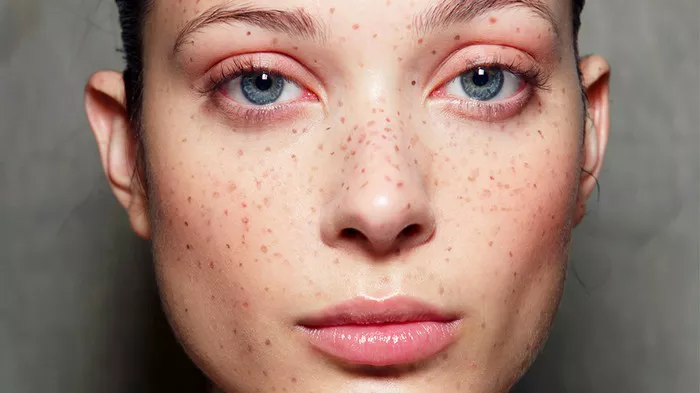Freckles are small, flat, brown spots that appear on the skin, especially on the face, arms, and shoulders. While freckles are harmless, some people may want to remove them for cosmetic reasons. Retinol is a common ingredient in many skincare products that claim to remove freckles. In this article, we will explore the benefits and limitations of retinol for freckle removal.
What is Retinol?
Retinol is a derivative of vitamin A that is commonly used in skincare products. Retinol has anti-aging properties and is used to treat a variety of skin conditions, including acne, wrinkles, and hyperpigmentation. Retinol works by increasing cell turnover and stimulating collagen production.
How Does Retinol Remove Freckles?
Retinol removes freckles by increasing cell turnover and stimulating collagen production. Freckles are caused by an increase in melanin, which is the pigment that gives skin its color. Retinol increases cell turnover, which can help reduce the appearance of freckles by removing some of the excess melanin. Retinol also stimulates collagen production, which can help improve skin texture and reduce the appearance of fine lines and wrinkles.
Benefits of Retinol for Freckle Removal
Non-Invasive: Retinol is a non-invasive treatment for freckle removal. Unlike other treatments, such as laser therapy or cryotherapy, retinol does not require any downtime or recovery period.
Effective for Mild to Moderate Freckles: Retinol is most effective for mild to moderate freckles. Retinol can help reduce the appearance of freckles by increasing cell turnover and stimulating collagen production.
Anti-Aging Benefits: Retinol has anti-aging benefits, which can help improve skin texture and reduce the appearance of fine lines and wrinkles.
Limitations of Retinol for Freckle Removal
Slow Results: Retinol is a slow-acting treatment for freckle removal. It may take several weeks or months of consistent use to see results.
Skin Irritation: Retinol can cause skin irritation, especially in people with sensitive skin. Retinol should be used in moderation and according to the instructions on the product label.
Sun Sensitivity: Retinol can increase sun sensitivity, which can increase the risk of sunburn and skin damage. It is important to use sunscreen and avoid sun exposure when using retinol.
Limited Effectiveness for Severe Freckles: Retinol is less effective for severe freckles. Severe freckles are deeper in the skin and may require more aggressive treatments, such as laser therapy or cryotherapy.
Conclusion
Retinol is a common ingredient in many skincare products that claim to remove freckles. Retinol removes freckles by increasing cell turnover and stimulating collagen production. While retinol is a non-invasive and effective treatment for mild to moderate freckles, it is less effective for severe freckles and can cause skin irritation and sun sensitivity. If you are considering using retinol for freckle removal, it is important to consult with a dermatologist to determine if it is the right treatment for you.
FAQs
1. What fades freckles?
Fading freckles typically requires consistent use of topical treatments or procedures that target excess pigmentation. Ingredients like hydroquinone, retinoids, vitamin C, alpha hydroxy acids (AHAs), and kojic acid are known to help fade freckles by promoting skin cell turnover and inhibiting melanin production. Additionally, sun protection is crucial to prevent freckles from darkening further, so using sunscreen with a high SPF rating and wearing protective clothing is essential.
2. What is the best way to remove freckles permanently?
Removing freckles permanently can be challenging, as freckles often reappear with sun exposure due to melanin production. However, treatments such as laser therapy, chemical peels, cryotherapy, or intense pulsed light (IPL) therapy may help reduce the appearance of freckles over time by targeting excess pigmentation and stimulating collagen production. It’s essential to consult with a dermatologist to determine the most suitable treatment option based on individual skin type and concerns.
3. What creams get rid of freckles?
Several over-the-counter and prescription creams contain ingredients that can help lighten freckles and other types of hyperpigmentation. Hydroquinone, retinoids, vitamin C, and alpha hydroxy acids (AHAs) are commonly found in these creams and work by promoting skin cell turnover and reducing melanin production. It’s important to use these creams as directed and consistently over time to see results, and consulting with a dermatologist can provide personalized recommendations based on individual skin needs.
4. Does retinol help brown spots?
Retinol, a derivative of vitamin A, is known for its ability to improve skin texture, reduce wrinkles, and even out skin tone, including brown spots caused by sun damage or hyperpigmentation. By promoting cell turnover and collagen production, retinol can help fade brown spots over time and improve overall skin appearance. However, it’s essential to use retinol products as directed, gradually introducing them into your skincare routine to minimize potential irritation, and always follow up with sunscreen during the day to protect against further sun damage.


